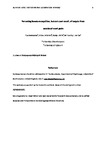Pretesting boosts recognition, but not cued recall, of targets from unrelated word pairs
| dc.contributor.author | Seabrooke, T | |
| dc.contributor.author | Mitchell, Chris | |
| dc.contributor.author | Wills, Andy | |
| dc.contributor.author | Hollins, Timothy | |
| dc.date.accessioned | 2019-11-28T10:47:09Z | |
| dc.date.issued | 2020-09-21 | |
| dc.identifier.issn | 1069-9384 | |
| dc.identifier.issn | 1531-5320 | |
| dc.identifier.uri | http://hdl.handle.net/10026.1/15204 | |
| dc.description.abstract |
Attempting to retrieve the answer to a question on an initial test can improve memory for that answer on a subsequent test, relative to an equivalent study period. Such retrieval attempts can be beneficial even when they are unsuccessful, although this benefit is usually only seen with related word pairs. Three experiments examined the effects of pretesting for both related (e.g., pond-frog) and unrelated (e.g., pillow-leaf) word pairs on cued recall and target recognition. Pretesting improved subsequent cued recall performance for related but not for unrelated word pairs, relative to simply studying the word pairs. Tests of target recognition, by contrast, revealed benefits of pretesting for memory of targets from both related and unrelated word pairs. These data challenge popular theories that suggest that the pretesting effect depends on partial activation of the target during the pretesting phase. | |
| dc.format.extent | 268-273 | |
| dc.format.medium | ||
| dc.language | en | |
| dc.language.iso | en | |
| dc.publisher | Springer Verlag | |
| dc.subject | Memory | |
| dc.subject | Learning | |
| dc.subject | Testing | |
| dc.subject | Pretesting | |
| dc.title | Pretesting boosts recognition, but not cued recall, of targets from unrelated word pairs | |
| dc.type | journal-article | |
| dc.type | Journal Article | |
| plymouth.author-url | https://www.webofscience.com/api/gateway?GWVersion=2&SrcApp=PARTNER_APP&SrcAuth=LinksAMR&KeyUT=WOS:000571710000001&DestLinkType=FullRecord&DestApp=ALL_WOS&UsrCustomerID=11bb513d99f797142bcfeffcc58ea008 | |
| plymouth.issue | 1 | |
| plymouth.volume | 28 | |
| plymouth.publication-status | Published | |
| plymouth.journal | Psychonomic Bulletin and Review | |
| dc.identifier.doi | 10.3758/s13423-020-01810-y | |
| plymouth.organisational-group | /Plymouth | |
| plymouth.organisational-group | /Plymouth/Admin Group - REF | |
| plymouth.organisational-group | /Plymouth/Admin Group - REF/REF Admin Group - FoH | |
| plymouth.organisational-group | /Plymouth/Faculty of Health | |
| plymouth.organisational-group | /Plymouth/Faculty of Health/School of Psychology | |
| plymouth.organisational-group | /Plymouth/REF 2021 Researchers by UoA | |
| plymouth.organisational-group | /Plymouth/REF 2021 Researchers by UoA/UoA04 Psychology, Psychiatry and Neuroscience | |
| plymouth.organisational-group | /Plymouth/REF 2021 Researchers by UoA/UoA04 Psychology, Psychiatry and Neuroscience/UoA04 REF peer reviewers | |
| plymouth.organisational-group | /Plymouth/Research Groups | |
| plymouth.organisational-group | /Plymouth/Research Groups/Centre for Brain, Cognition and Behaviour (CBCB) | |
| plymouth.organisational-group | /Plymouth/Research Groups/Centre for Brain, Cognition and Behaviour (CBCB)/Cognition | |
| plymouth.organisational-group | /Plymouth/Research Groups/Institute of Health and Community | |
| plymouth.organisational-group | /Plymouth/Users by role | |
| plymouth.organisational-group | /Plymouth/Users by role/Academics | |
| plymouth.organisational-group | /Plymouth/Users by role/Researchers in ResearchFish submission | |
| dc.publisher.place | United States | |
| dcterms.dateAccepted | 2019-11-26 | |
| dc.rights.embargodate | 2021-9-21 | |
| dc.identifier.eissn | 1531-5320 | |
| dc.rights.embargoperiod | Not known | |
| rioxxterms.versionofrecord | 10.3758/s13423-020-01810-y | |
| rioxxterms.licenseref.uri | http://www.rioxx.net/licenses/all-rights-reserved | |
| rioxxterms.licenseref.startdate | 2020-09-21 | |
| rioxxterms.type | Journal Article/Review | |
| plymouth.funder | Learning from total failure: why do impossible tests boost learning?::ESRC |


